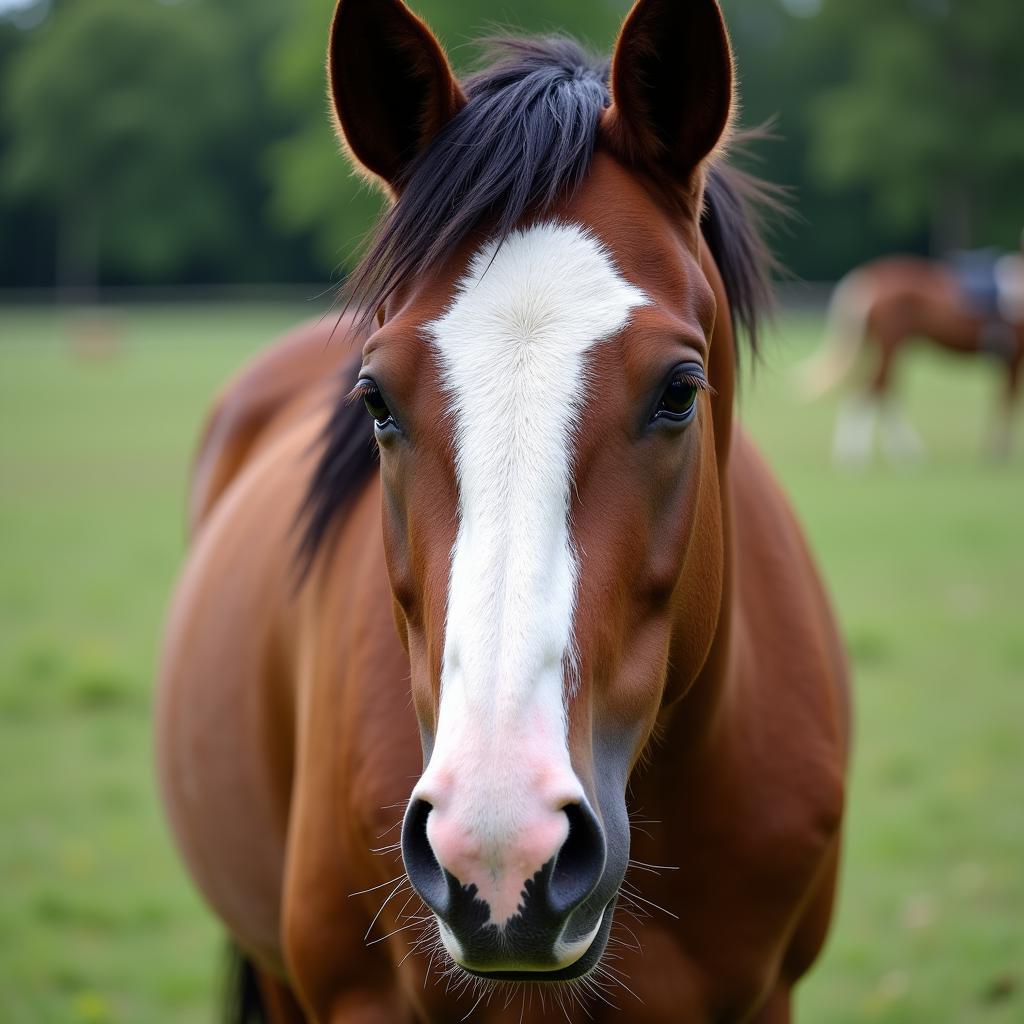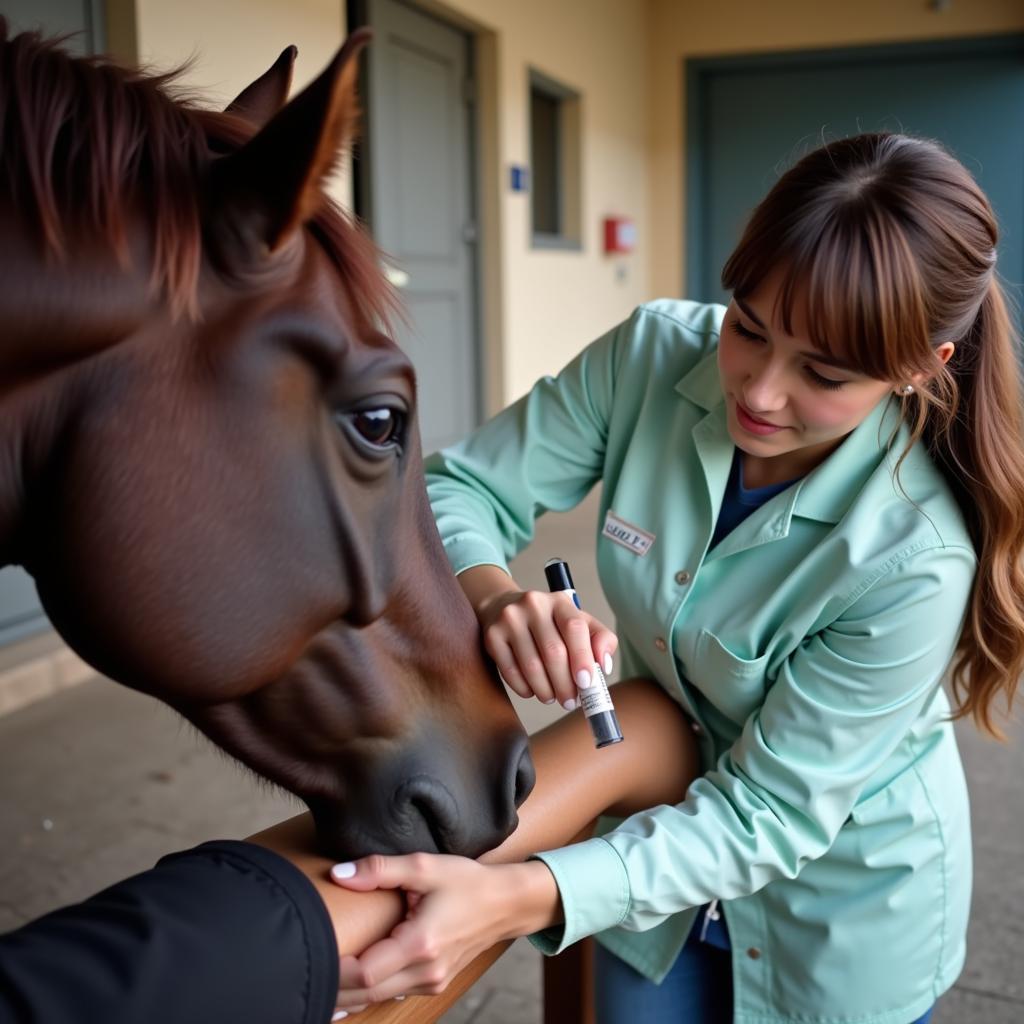Down syndrome in horses, while not a medically accurate term, is often used colloquially to describe a set of physical and developmental characteristics reminiscent of the human condition. These horses may exhibit certain facial features, such as a broader forehead and widely spaced eyes, and potentially experience learning difficulties or delayed development. Understanding these unique needs is crucial for providing appropriate care and ensuring a good quality of life.
 Down Syndrome Horse Facial Features
Down Syndrome Horse Facial Features
While horses don’t actually have Down syndrome, the term serves as a useful shorthand for a complex combination of genetic and developmental variations. This can lead to a range of presentations, from mild to more severe, affecting both physical appearance and cognitive abilities. Just like humans with Down syndrome, these horses require specialized attention and a tailored approach to training and management. If you suspect your horse has signs of what’s often referred to as “down syndrome,” consulting with a veterinarian is crucial for accurate diagnosis and creating a personalized care plan. This may involve specific dietary recommendations, adapted training methods, and attention to potential health concerns.
What Causes “Down Syndrome” in Horses?
The exact genetic mechanisms that contribute to these characteristics in horses are still being researched. It is likely a combination of factors rather than a single genetic anomaly. Some studies suggest potential chromosomal abnormalities, while others point towards inherited genetic predispositions. This is an area where ongoing veterinary research is continually deepening our understanding. Early intervention and personalized care strategies are key to helping these horses thrive.
 Horse Genetic Testing
Horse Genetic Testing
Caring for a Horse with “Down Syndrome”
These horses often thrive in calm and consistent environments. A predictable routine, clear communication, and positive reinforcement training methods are particularly beneficial. Just as with lameness in hind legs of horses, recognizing and addressing specific needs is paramount. Understanding their unique learning styles and potential physical limitations is essential for creating a comfortable and supportive environment. This might involve adjustments to their living space, such as providing extra padding in stalls or ensuring easy access to food and water.
Managing Health Concerns
Horses with these characteristics may be more susceptible to certain health problems, such as cardiac issues or weakened immune systems. Regular veterinary check-ups, including blood work and physical examinations, are essential for early detection and management of any potential health challenges. It’s important to work closely with your veterinarian to develop a preventative health plan tailored to your horse’s specific needs. This can include vaccination schedules, dental care, and parasite control, similar to how you’d manage a horse limping front leg no swelling.
Is Special Farrier Care Necessary?
Just as with underrun heels horse, proper hoof care is vital for these horses. Regular farrier visits are crucial for maintaining healthy hooves and addressing any potential issues related to conformation or gait abnormalities. Your farrier can recommend appropriate trimming and shoeing strategies to support the horse’s unique needs.
Foaling and “Down Syndrome” Characteristics
It’s important to note that these characteristics are not always apparent at birth. Some features may become more noticeable as the foal grows and develops. As with foal alert horse systems, careful monitoring of the foal’s growth and development is crucial, especially if there’s a suspected genetic predisposition.
Nutrition and Diet
Just like with horse feed comparison, choosing the right nutrition is essential for supporting overall health and well-being. Your veterinarian can advise on appropriate dietary adjustments to meet the specific needs of a horse with these characteristics. They may recommend specific supplements or adjustments to the type and amount of feed to ensure optimal nutrition and growth.
In conclusion, understanding and addressing the unique needs of horses with characteristics often referred to as “down syndrome” is essential for ensuring their well-being. With proper care, management, and a supportive environment, these horses can live fulfilling lives. Down syndrome in horses reminds us of the importance of individualized care and the remarkable resilience of these animals.
FAQ
- Can horses really have Down syndrome?
- What are the common signs of “down syndrome” in horses?
- How can I best care for a horse with these characteristics?
- Are there any specific health concerns I should be aware of?
- What kind of training methods are most effective?
- Where can I find more information and support?
- What role does genetics play in these characteristics?
For further information on related topics, please see our articles on lameness in hind legs of horses and underrun heels horse.
Need help understanding horse feed options? Check out our horse feed comparison. Considering a foal alert system? Learn more about foal alert horse systems.
For assistance, please contact us: Phone: 0772127271, Email: [email protected] Or visit us at: QGM2+WX2, Vị Trung, Vị Thuỷ, Hậu Giang, Việt Nam. We have a 24/7 customer service team.